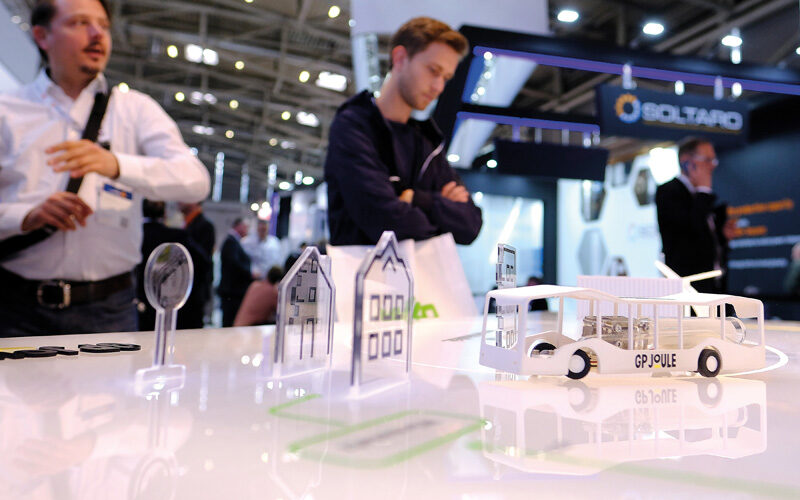Conferences are an integral part of the battery industry, but as a plethora of events were shut down in 2020 due to the COVID-19 pandemic, organisers diversified and ran their shows online. However, this approach split opinion. Paul Crompton speaks to event organisers to understand the need for battery conferences and their future in this new world order for 2021 and beyond.
Last year will be one to remember; in the future we will tell our grandchildren of when we spent months in ‘lockdown’, why people hoarded toilet rolland pasta, and how masks became the ‘new normal’ as COVID-19 swept its deadly hand across the globe.
Amid the turmoil, it was inevitable that conferences would feel the brunt of lockdown measures as international tourism became increasingly difficult, flights were cancelled and quarantine measures for travellers were put in place across the world.
At one point, in-person conferences were being cancelled almost daily, either rescheduled— only to be re-scheduled— or taken online.
Going online proved a double-edged sword. This writer enjoyed the benefit of being able to watch speaker presentations in his own time, sometimes many days after the conference. But dissenting voices from the exhibitor fraternity expressed concern they were not able to meet the numbers of people they could at in-person events.
So, as the sun set on 2020, it was clear the conference industry was at a crossroad; will face-to-face meetings remain a key part of the industry, or are we destined to become virtual delegates in a digital world?
Why bother?
As BEST cancelled trip after trip, one question was on our mind: why are industry conferences important, and how important is it to continue events in the next 10 years?
Ten years ago, when our industry was still relatively niche, there were a few conferences. Now they are more widespread and, as a subsequence, what was typical five years ago is no longer.
Gone are the days when speakers would give a presentation, the chair would ask questions, everybody would clap and the next company representative would sidle on stage. Today, delegates expect a two-way conversation, as attending conferences has become as much about meeting people as it is about expanding our knowledge.

Sectors like the battery industry— which boasts those attractive ingredients of rapid growth, widespread innovation and investment activity— have become a touch-point for successful event organising, says Steve Bryan, managing director of Event Partners and conference veteran of more than a decade.
“In fact, a good event becomes an inevitable consequence of the strength of the industry. The opportunity for an entire sector to get together in person is crucial, and when you consider just how many interactions take place, how much knowledge is shared and the amount of business conducted, an entire industry can take strides forward in just a few days,” he says.
The sharing of information is a key ingredient in a successful event. With many people in our industry having spent decades working in lead production, lead battery manufacturing, research or management, meeting friends and contemporaries regularly at conferences and events is, and always will be, an important aspect of business.

Whether it’s winning new business, meeting collaborators, joining partnerships or setting up research programmes, the ability to meet, engage, and work together remain vital, says Dr Andy Bush, managing director of the International Lead Association (ILA), which hosts the biennial European Lead Battery Conference (ELBC).
Sharing of information at conferences can be broken down into two distinct areas: the first is delegates gain information about a topic, company, or product they might not have otherwise have got; the second is delegates can provide information about their own product to someone who otherwise wouldn’t have received it.

“Those two fundamental reasons define the whole reason of having a meeting in a world where we are time poor and resource rich,” says Anthony Price, director of Swanbarton, which produces the International Flow Battery Forum.
In fact, it could be that the more niche the market sector, the greater the need for that industry to have a place where it can meet and discuss developments within its market sphere.
Gaining industry insight
The World Wide Web is a great resource, with a host of information at our fingertips, but if we don’t know what we are searching for, chances are it will not be found.
“That’s the reason why you go to shows, but don’t realise you needed to before you went,” says Price. “Many people don’t realise that important point. Unless you are willing to take the trouble to find out what’s out there, you wont know until it’s too late.”
For example, where else do you go to meet manufacturers or find out about the specialist equipment your company needs for its latest order?
Industry conferences are innovation platforms that offer a high degree of market transparency; events allow attendees to gain a comprehensive overview of a wide range of innovations, products and services, as well as price-performance ratios and market trends.

“For most companies, the presentation of new products and services is the greatest benefit of participating in exhibitions,” says Florian Wessendorf, MD of Solar Promotion International.
“Face-to-face product presentation can increase sales success in many ways, since all senses of the visitors are addressed to create an intensive event experience. Visitors can actively test products on site and convince themselves of their functionality and quality,” he says.
“Exhibitors can respond directly to customer questions and wishes and convince with professional competence and charisma. The combination of competent product presentation and the possibility of product testing contributes to a customer-oriented image.”
The other benefit of in-person conferences is a delegate can turn off their computer and phone, and spend two days of quality time thinking about the subject. If you are in the office or at home you probably won’t do that, says Price.
There is, however, a concern delegates will get ‘virtual event fatigue’. “I don’t think many people want to sit at a computer screen for three days, hearing an endless stream of sales pitches and un-engaging content, let alone go through that experience more than once— so we have to be mindful about what we are offering and what we can realistically ask of our audience and supporters,” says Bryan.
“For us, the answer to this is to provide less frequent but higher quality and interactive content; discussions rather than presentations, and a networking platform that works intelligently to match the right people; to allow meetings to be scheduled at the delegate’s convenience, and held from a mobile device if needs be— you don’t have to sit at a screen for eight hours a day.”
Positives of change
As we’ve seen, face-to-face meetings are crucial to the industry, and while organisers can attract a wider audience to online events, the opportunity for chance encounters with potential customers are narrowed considerably; after all, if you are in a niche sector you need to know who your friends are.
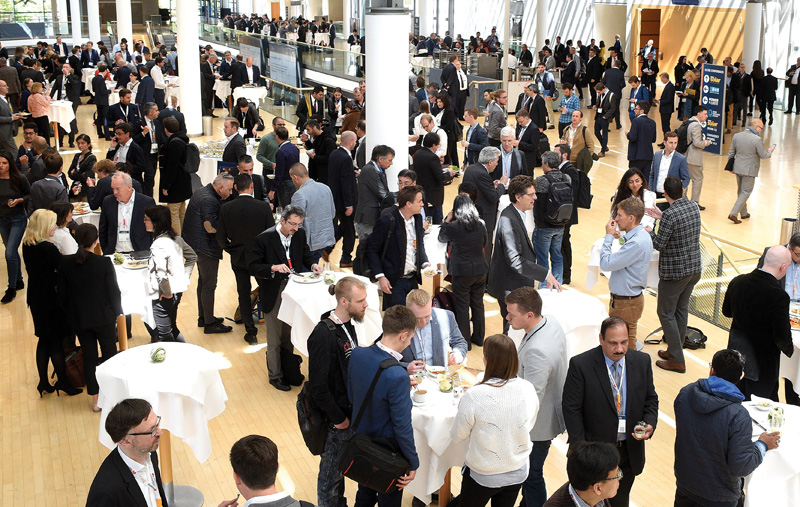
In theory, a positive for online events is companies can get to more people from more geographical locations— whether those people are paying attention is obviously much harder to gauge as a speaker or event organiser.
ELBC made provisions for people to book virtual meeting slots with booth representatives at its 2020 online event, to enhance the opportunity of exhibitor/customer interaction. But nothing beats a drowsy walk around an exhibition hall between speaker sessions for ad hoc encounters.
The ELBC event, says Bush, was positively received by most of its speakers and delegates, who enjoyed the format and live sessions. However, exhibitors had mixed experiences— as did delegates visiting online exhibitors. “It worked well for some, less so for others,” says Bush. “You simply cannot replace the live experience with the online experience, no matter how clever the technology is.”
The Battery Cells & Systems and the Vehicle Electrification Expo show in early December gave its organisers and industry suppliers a chance to flex their creativity to engage with groups that would traditionally come together physically for a few days but have no other direct communication.
“For us, we certainly looked to take the best parts of each format and combine them to create an experience that provided value to our industries for a greater period of time,” said the event’s organiser Bryan. “Being able to network in advance with attendees, host introductory, virtual meetings before meeting in person at the show, and providing some content online, all had a fantastic impact and I believe all these things will only strengthen the physical event.”
Launching into a decentralised and digital energy world offered new prospects and potential for innovative formats at Solar Promotion. The company’s digital conferences included seminars, Innovation Days, webinars, podcasts and virtual award ceremonies as well as the usual live discussions.
Hybrid events
For the reasons outlined, there is a strong argument for face-to-face events, but could we one day see events held exclusively online?
The scenario is unlikely. What’s more likely is hybrid events that utilise a mix of online and traditional conferences in the future. And there’s value in that for delegates who may not, for whatever reason, be able to attend in person.
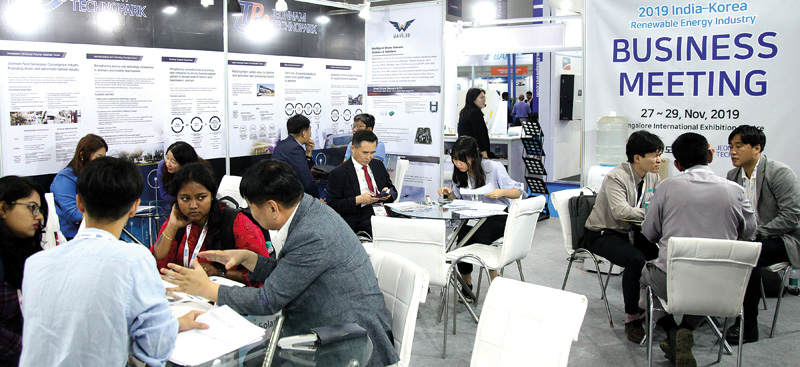
For those people, digital or online events will have relevance for keeping them in touch with the industry during the year, and to provide the latest market and technical insights continuously.
Hybrid events open up new possibilities and challenges in equal measures. Developing both physical exhibitions/conferences and virtual events will be key for organisers to position themselves as the most relevant industry platform.
Wessendorf, whose company has events across many continents, is sceptical that future events will only be held online. He believes that, post-COVID-19, events will be held in both formats.
“Our strategy is to provide valuable content the whole year long and serve as the go-to platform for the industry,” he says. “Digital formats will strengthen our leading position as organisers of physical industry events.”
The industry is clearly going to have to adapt its model to allow for more hybrid activity and, of course, ensuring the safety of speakers, delegates and exhibitors.
“There is definitely a future in hybrid activity,” says Bush. “A good mixture of well-produced online material, plus face-to-face engagement for those able to attend; that’s the best of both worlds. And the key to success online is good production and quality content. A Zoom or Teams-style session bolted onto a live conference is not likely to be hugely inspiring experience.”
Of course, events are not put on for the love of them alone. A negative point is: it’s difficult to know how to monetise it. Should organisers charge for the event or not?
“There’s a thought that because it’s online it should be free— but it costs more money to organise a one-day web conference than a days in-person conference,” says Price. “I think most people forget that.”
A hybrid event could double an organiser’s on-site costs, which Price says is phenomenal. It could mean organisers will have to attract three times as many people, or up admission charges to cover costs. However, in a world dominated by the bottom line, could this mean highly specific content or watered down programme streams to cater for everybody? Perhaps even events so big it will be hard to take them all in with just three or four days.
The other concern is timing; organisers will be able to combine events that cover Europe and Asia, or Europe and America, or Asia and America but won’t be able to cater for all three at the same time.
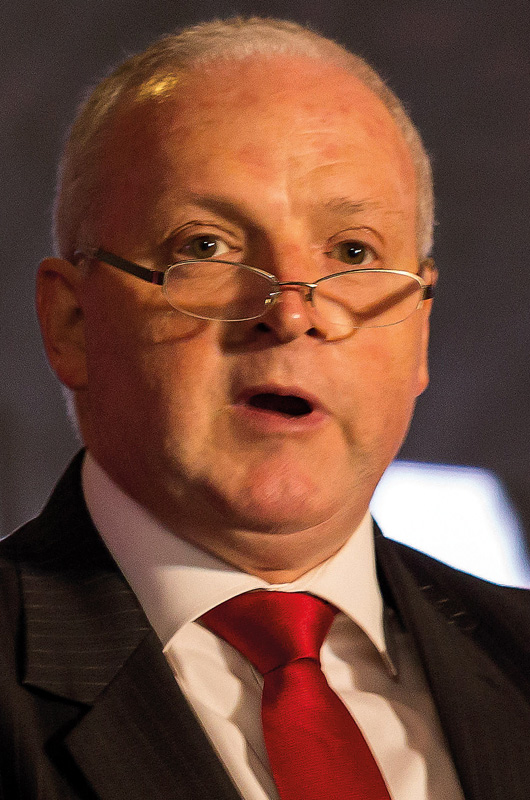
Mark Stevenson, chairman of the Asian Battery Conference, says: “I don’t think that in the future events will only be held online, and I don’t see any benefit of doing this. Do you really think people will sit by their computer? One event that was very late for my time zone, I listened to it in bed— and fell asleep half way through.”

Roger Miksad, senior vice president and general counsel at Battery Council International said that, despite his organisation’s members urging the BCI Convention + PowerMart to return to its in-person format, there is value in being able to connect with its members more regularly through virtual meetings.
“Virtual meetings and webinars allow us to offer more focused or niche content to a greater audience,” says Miksad. “For example, we saw above-expected attendance at our online EHS Conference, including many attendees who might not have been able to travel to an in‑person event.
“I think we will see some great opportunities in the future, to reach a broader audience through ‘hybrid’ events, but the core focus of the BCI Convention will always be to gather the industry’s leaders together in person.”
One thing we know, is that just like a physical event, you can only expect to get out of it what you put in. Bryan says: “The events that have worked well are the ones with high quality, engaging content and a smart approach to networking that means your exhibitors are actually able to find new customers, partners and collaborators.”
Networking
While feedback from virtual events are positive, a common theme within the industry is that all speakers and delegates are missing the opportunity to network in real-life surroundings.
Solar Promotion’s 2019 Intersolar Europe event boasted 100,000 square meters of exhibition space, and welcomed around 50,000 visitors from 162 countries. If you were one of the 1,354 exhibitors at the event, the placing of high visitor frequency, alongside an existing and potential customer-base in one place, made the show one of the most effective communication, marketing and sales channels in your promotions calendar.
In-person conferences make personal and direct contact easier for exhibitors— to both convince interested parties of the products and services, and to win them as customers. This is not the case for online events.
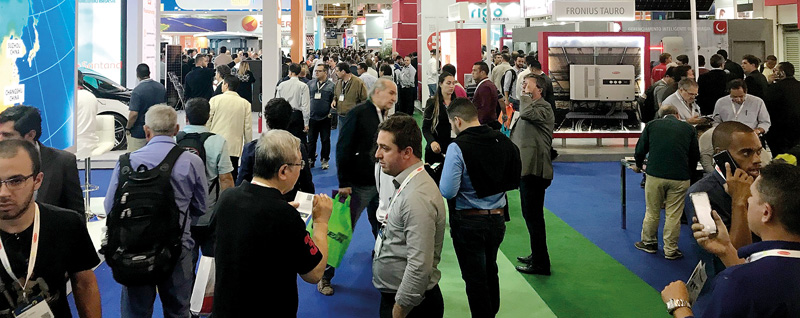
Stevenson says: “It’s the knowledge gathering, meeting of friends, holidays, networking, getting out of the office, marketing, selling product, etcetera. There are just so many drivers and each has their own. In-person events simply have to happen to keep the industry vibrant and moving.”
For BCI, the cancellation of in-person events around the world has reemphasised the value of meeting face-to-face at events, such as its annual event.
“There’s a high level of camaraderie in our industry and BCI’s members appreciate the annual meeting as a time to gain access to industry information they might not otherwise access— and for many it’s a chance to ‘recharge’ their personal energy and enthusiasm for this business,” says Miksad.
“No online event— and I have attended and hosted many this year— can replace the networking opportunities and camaraderie that comes from meeting with your old and new colleagues.
“Particularly for new members of an industry and start-up companies, in-person events are a critical way to meet potential colleagues, suppliers, and customers.”
Return to the old normal
The people interviewed for this article expressed a definite optimism that the events industry will get back to pre-COVID-19 levels of normalcy. However, with digital events being in their infancy, and as with any first adopter status, some people will have had incredibly positive experiences while others will find them less rewarding.

So when can we expect to get back to the ‘good ole days’ of boarding a plane to an ‘exotic’ destination every month, battling constant jet lag and mithering through the days with an aching kidney?
Pam O’Brien, VP operations at BCI, says it is difficult to put a timeline on a return to some sort of ‘normalcy’.
“Event planning professionals across all industries continue to innovate in response to their constituent’s innate need to meet in-person,” she says. “We can only hope that an end is in sight and, one day, the current levels of safety measures will become a thing of the past.”
For Bryan, the events industry will return back to normal, and ‘in fact’ could be even better. “I think some of the systems we had put in place to be COVID-safe are great additions regardless of the pandemic status— increased hand hygiene, contactless entry, more space between seats at dining and the conference. These, along with more attention given to reducing queues and crowds, can only be a good thing,” he says.
The future
Last year was obviously very different, and the world of virtual conferences has become a part of the battery industry, ‘but they will never replace the full value of face-to-face contact and the depth achieved when you meet personally’ says Bush. Hear, hear!

